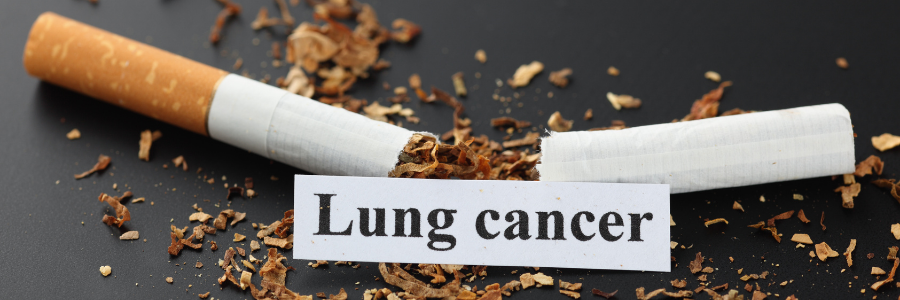

Cancer is a disease in which the cells in the body grow out of control. Lung cancer begins in the lungs and may spread to lymph nodes or other organs in the body, such as the brain. Lung cancers usually are grouped into two main types, small cell and non-small cell. These types of lung cancers grow and get treated differently. Non-small cell lung cancer is more common than small cell lung cancer. Approximately 541,000 Americans have been diagnosed with lung cancer at some point in their lives. Lung cancer is the leading cancer killer in women and men, accounting for approximately 25% of all cancer deaths.
1.) Smoking: Cigarette smoking is the number one risk factor for lung cancer. People who smoke cigarettes are 15 to 30 times more likely to get lung cancer than people who do not smoke. Cigarette smoking is linked to about 80% to 90% of lung cancer deaths in the United States.
2.) Secondhand Smoke: Secondhand smoke is smoke from other people’s cigarettes, cigars, or pipes. When a person breathes these in, it is like they are smoking.
3.) Radon: Radon is an inert, colorless, and odorless gas that can get trapped in houses and buildings. Breathing radon over time increases your risk of lung cancer. Radon is the second leading cause of lung cancer in the United States, only behind smoking. It is estimated that about 21,000 people die yearly from radon-related lung cancer.
4.) Other Substances: Exposure to other substances that increase the risk of lung cancer includes asbestos, arsenic, diesel exhaust, and some forms of silica and chromium.
Lung cancer affects everyone differently; the symptoms may vary from person to person depending on the severity of the cancer. Lung cancer symptoms may include:
Metallic Taste (Dysgeusia), including bitter or sour taste, is a common side effect of lung cancers, medications, and chemotherapy treatments. People who experience xerostomia (dry mouth) often also suffer from dysgeusia. Xerostomia commonly occurs in smokers, as tobacco and nicotine use worsens dry mouth symptoms.
Chemotherapy and radiation are also causes of metallic taste. Metallic taste can often cause poor nutrition, as it causes aversion to certain foods because food tastes unpleasant or different. This also often leads to people eating less or making poor nutrition choices.
To mask the unpleasant taste caused by dysgeusia, people choose to eat spicier, saltier, or overly sweet foods. As a result, sodium and sugar intake often increases and can lead to complications or cause additional health problems.
There are many home remedies to treat metallic taste. These include chewing sugar-free gum, using non-metallic cookware, staying hydrated, and practicing good oral hygiene. However, these remedies may take some time to start working or may not work at all. MetaQil is the only OTC solution for immediate relief of metallic taste.
MetaQil Oral Rinse is first-of-its kind product that alleviates metallic taste in the mouth, providing long-lasting comfort and relief.
Interested in trying MetaQil?
Use Coupon Code
LUNGFORCE
at checkout
to get 20% OFF your order
MetaQil is the #1 over-the-counter solution for symptomatic relief of metallic taste. MetaQil’s scientifically designed formula alleviates metallic taste caused by chemotherapy, GERD, and a variety of medications. MetaQil gently cools the mouth and provides instant, long-lasting relief from metallic taste symptoms. It has a mild flavor and does not “sting” the mouth like an every-day mouthwash. Regular use of MetaQil can help patients return to healthy eating and adequate nutrient intake.
For best results, use approximately 5 ml (one teaspoon) of MetaQil®, rinse for 30 seconds, and spit out. MetaQil can be used on an as-needed basis. Use alone or after each time you brush your teeth
Important: If you are pregnant or breastfeeding, please consult your physician before using MetaQil. Do not use MetaQil if you are taking any medications that are contraindicated with the product. Please consult with your physician if you have any concerns regarding the use of this product. Keep out of reach of children.
